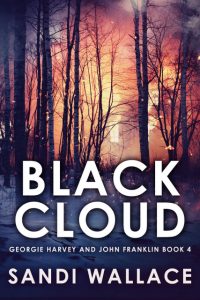Mt Dandenong writer Sandi Wallace explores the different challenges of writing short stories and novels with Sisters in Crime’s Vice-President, Robyn Walton – and gives lots of hot tips for the Scarlet Stiletto Awards.
Hi Sandi. In our annual Scarlet Stiletto short story competition, you’ve been a standout entrant over the years, with wins in several categories. I’m going to ask you about those stories, then pick your brains for story writing tips. Also, I’m hoping you’ll tell us about your published story collections and update us on the progress of your crime novel series.
Thanks for the opportunity to chat and share my suggestions. I hope it helps some budding crime writers and whets their appetite to enter the Scarlets!
First up, tell us about your most recent winning stories, their inspiration and how they evolved.
My wins in the Scarlet Stiletto Awards 2019 were “Sweet Baby Dies” (Best Romantic Suspense) and “Abandon” (Special Commendation). They are quite different to each other, and to my earlier stories, because whether it’s short- or long-form fiction, I write the story that’s demanding to be written. Rightly or wrongly, I don’t set out to write to a specific category for the Scarlets. I wait for a story to speak to me, and hope to hell that the finished thing fits a category besides general. So, both of last year’s winners are contemporary stories, but one is urban, the other rural crime. One is written in first-person, the other in third-person point of view (POV). How they came to me is unique, as I’ll outline below. But both evolved quite organically, which is how I tend to write, with some plotting to get started and a fair bit of pantsing (flying by the seat of my pants, often with little clue as to how it will end).
 “Sweet Baby Dies” features Mickey Fox, her firm’s best private investigator — sometimes thanks to, rather than despite, being wedded to her sports wheelchair. My lovely mother-in-law, Dot, is sadly no longer with us, but she was incredible and helped inspire Mickey. Dot contracted polio as a young teen, yet managed to have four children, and later in life to live independently, despite her disability and reliance upon a wheelchair. My hubby and I had been talking about Dot, reminiscing, while we were on holidays. Feeling very relaxed and happy, I had a great sleep during which Mickey and ideas for her story came to me. This one is urban, set in Melbourne’s CBD and surrounds, and Mickey wanted to tell her story in first-person, so I let her. It opens with her thinking her luck is in when she lands both a priority job and a newbie investigator to shadow her at work. While things heat up with the new dude, she should’ve touched wood when she wished for an exciting case because Vaucluse versus Vaucluse turns ugly.
“Sweet Baby Dies” features Mickey Fox, her firm’s best private investigator — sometimes thanks to, rather than despite, being wedded to her sports wheelchair. My lovely mother-in-law, Dot, is sadly no longer with us, but she was incredible and helped inspire Mickey. Dot contracted polio as a young teen, yet managed to have four children, and later in life to live independently, despite her disability and reliance upon a wheelchair. My hubby and I had been talking about Dot, reminiscing, while we were on holidays. Feeling very relaxed and happy, I had a great sleep during which Mickey and ideas for her story came to me. This one is urban, set in Melbourne’s CBD and surrounds, and Mickey wanted to tell her story in first-person, so I let her. It opens with her thinking her luck is in when she lands both a priority job and a newbie investigator to shadow her at work. While things heat up with the new dude, she should’ve touched wood when she wished for an exciting case because Vaucluse versus Vaucluse turns ugly.
On the other hand, “Abandon” is a rural crime story, set in the impoverished, drought-stricken town of Glory Valley. Local journalist Chris Olden’s story is in third-person POV, and she’s a woman weighed down by her own secrets when the town’s first murder in two decades takes place — a huge story by the valley’s standards. I love rural Australia, love to live, work and play in the country, and the plights and boons of rural life frequently inspire me. So the setting and the town’s struggles, all so real for many areas in Australia, came first for “Abandon”, closely followed by the main character. The plot developed from there, driving up to when Chris pieces together all the whys, and realises who the killer is, and she must decide if duty overrules sentiment.
And your earlier winning stories?
I’m thrilled to have won four other category prizes and four further special commendations in the Scarlets over the years since 2013. These vary greatly in point of view, setting, characters and the featured crimes, though each is a contemporary story. The central characters are police officers — police on the beat in various jurisdictions and seasoned detectives — and everyday people — a cabinetmaker, journalist, homemaker, true-crime writer and flavourist. Between them they witness, investigate, solve, avenge and are victims of serious crime. Murder in the midst of high-speed car chases, abduction, fraud, carjacking, statutory rape, theft, vindictive bullying and serial arson. All come out fighting. Some find and lose love, or suffer the ultimate betrayal.
I understand if you want to keep a few trade secrets to yourself! But can you give potential Scarlet Stiletto entrants some general tips for creating and submitting a story?
Of course! There is no right or wrong way to create, but perhaps something from my approach will resonate.
- Write the story that wants to be written, rather than forcing theme, setting, character or award category;
- Experiment with character, style, point of view, tone, setting and the crimes involved;
- Ensure there is a strong female central character (hero or anti-hero) and a crime (or crimes) serious and interesting enough to hold the reader’s attention;
- Place in crime can be like another character. Combining the elements of place, people and environment can imbue a story with atmosphere, unease, tension and believability;
- Start the process early. Write a full draft, edit it, let it sit. With fresh eyes, come back to the story with your editor’s hat on;
- Over-write initially. Later, edit back to within the word count. This process will be ongoing throughout the stages of editing;
- Add in whatever you subsequently realise is required to develop character, plot or link the sections of the story;
- Limit adverbs, adjectives, similes and metaphors, use active verbs and make every word count;
- If you put something in the story, use it to develop the character/s or story;
- Later editing will involve various stages. For me, it’s another on-screen edit — it can help to zoom in to focus on one sentence, one paragraph at a time while tracking changes, then to check each tracked change before committing to them. When it seems to be perfect, it probably isn’t yet. Print off the story, read it aloud from this hardcopy. Make last edits to finalise;
- Adhere to all the contest rules: minimum and/or maximum word count, line spacing, font specifications (type and/or size), one-sided print (or online entry, or both), character, setting or theme requirements, and so on. Allow generous margins;
- Write a grabbing title. This may come quickly and easily, but doesn’t always. Let it reflect the story tone, style, theme;
- Bringing a crime story to its end is as hard as it is to write a great opening… and as important. The climax and conclusion must fit with what has gone before, and feel somewhat right or fair, even though justice is not always legal or official, good guys don’t always win and endings can be unhappy.
Now, I know we can find your winning stories in the various collections put out by Clan Destine Press. And they’re now available in your two short-story collections, along with other stories?
It wasn’t until I started entering short crime stories in contests that I realised how challenging the craft is — and just how fun and addictive it can be. A bonus of my compulsion to write at least a couple of short crime stories a year is that I have built a portfolio of short fiction. Many of my recent stories — including my Scarlet Stiletto Award-winners (category prizes and commendations), a finalist in an open international contest, and others — are now available in two volumes of short stories, thanks to my new publisher. On the Job comprises stories with central police characters, and Murder in the Midst features eight different women with one thing in common: serious crime. (Various formats of all Sandi’s books are available, including paperback and Kindle, with more to come. Please visit Amazon for more details.)
I’d love to add that I’m grateful for competitions such as the Scarlet Stiletto Awards for the opportunity to hone my short story skills. Since winning my first Scarlet in 2013, I have gone on to have six books published and I’ve collected more awards for my short- and long-form fiction. There is no denying the inspiration to keep doing what I love that each of these honours has gifted me. So for all writers new to the Scarlets, enjoy writing and entering, and good luck. But watch out — you might end up addicted too.
Some readers know you best as a novelist. Has story writing helped you with novel writing? Has novel writing helped you create stories? Or are they very different crafts?
Both are challenging to write, and novels are my first love, but I do feel that each craft feeds into and helps the other. What I learn through researching, penning and editing my novels naturally value-adds to my short story writing. Short stories let me experiment with various elements that might not fit my current novel-in-progress, but all adds to my writer’s skillset. Writing short stories helps me keep my novels tight and active. To craft a complete crime story in less than 5000 words that engages and satisfies readers isn’t easy, and the process reminds me how to make every word count with nothing wasted, draw strong characters, set place and time effectively, get the pace right, know where to start the story, how to transition scenes and bring it to a satisfying conclusion.
Short-form writing and entering competitions are great ways to build experience in crafting plots, working to deadlines, making every word count, writing effective titles and synopses (if you’re shortlisted in the Scarlets, you’ll be asked for a short synopsis of the story), which are disciplines that may help your long-form fiction. Short story contests may be opportunities for feedback (especially in the form of being shortlisted or winning) and to expand your writer’s bio sooner than with novels.
 You have an ongoing rural crime series. When will we be seeing a new instalment?
You have an ongoing rural crime series. When will we be seeing a new instalment?
My latest, brand-new rural crime thriller Black Cloud was released on 22 July. This is the fourth instalment in my contemporary series, and readers can enjoy each book as a standalone or follow the characters from the beginning.
Here’s a taste of Black Cloud:
An anything-but-routine welfare check by two Daylesford police officers at a farm in Korweinguboora. A fatal house explosion at the property. Local cop John Franklin and Melbourne journalist Georgie Harvey are among the first responders — and two of the seven people directly impacted are their mates. Franklin seeks answers and someone to hold accountable while Georgie investigates her toughest story yet. The greatest tragedy to ever strike the small town of Korweinguboora shatters more than just one rural community.
Thanks for your time and your fiction, Sandi.
My great pleasure, Robyn. Thanks for having me!
Sandi Wallace’s latest book, Black Cloud, is available from Amazon. Signed copies are available from sandi@sandiwallace.com
